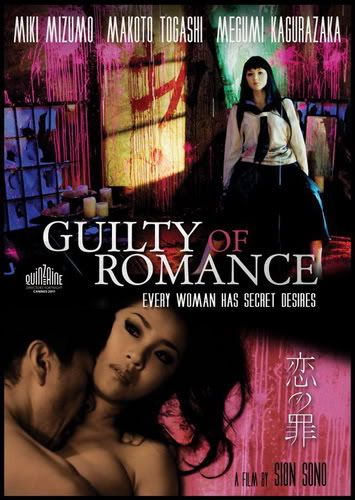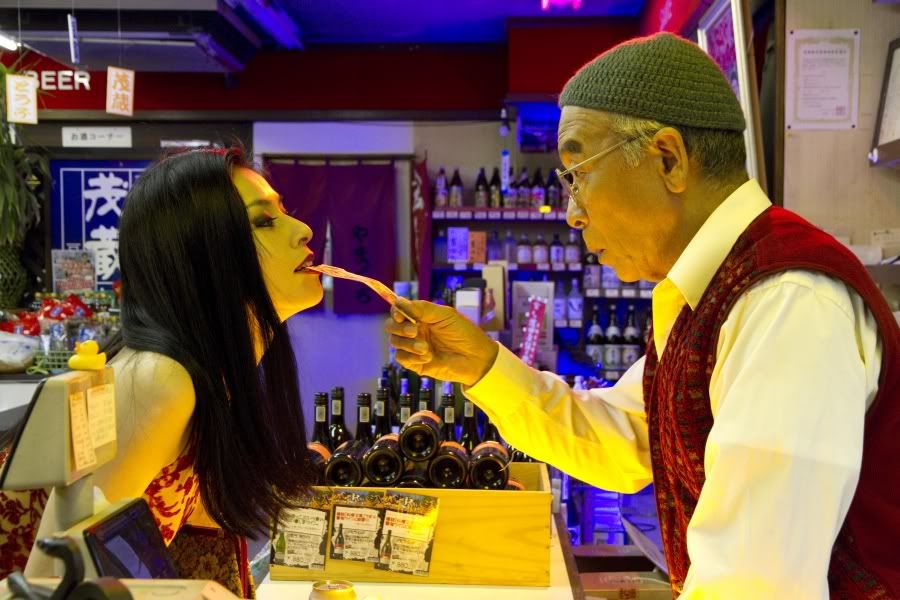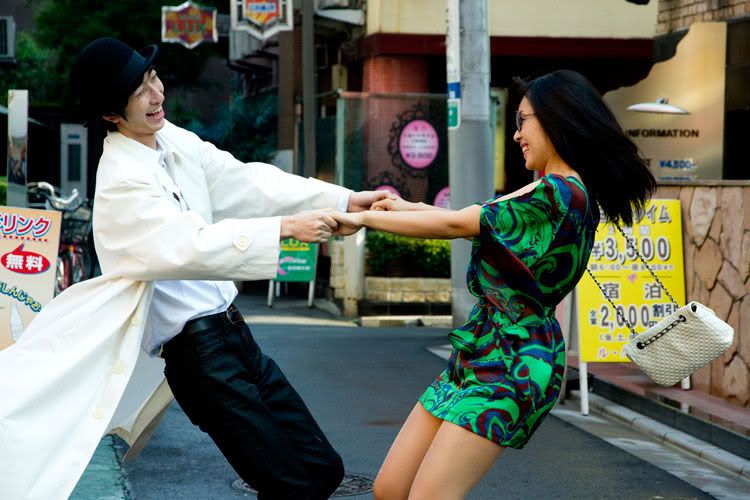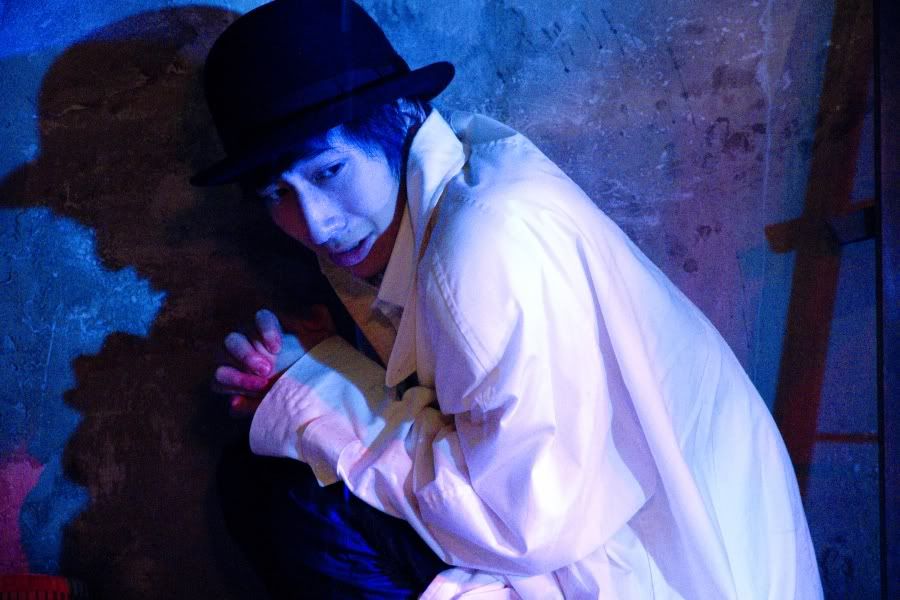Guilty of Romance

Title: Guilty of Romance
Rating: 3.5/5
Genre: Avant-Garde, Dark Drama, Horror, Sexploitation
Starring: Makoto Togashi, Megumi Kagurazaka
Director: Sion Sono
Language: Japanese
 Now emerging with the final part of his “Hate Trilogy,” (the first two being “Love Exposure” and “Cold Fish” respectively) Sion Sono is one of those few directors on my list that no longer requires me to read anything about their newest work to already want to see it; his style so unique and outside of the conventions of modern cinema that whatever he's up to you can be assured it'll be strange, thought-provoking, and if you're lucky, actually make sense first time. The works aren't mindfucks; they aren't puzzles waiting for you to mentally find the piece to put everything else into context, they just require attention to the details as he rapidly descends the viewer into his chaotic visions of darkness. This film is no different, I didn't read the back of the box but have no idea how it would have been described; yes there is a little violence and a lot of sex and nudity, some psychological analysis of madness – arguably everyone in the film is insane in their own way – and a fair dollop of darkness in every aspect, but really the best description perhaps comes from the title. This is a film telling the story of a woman who is guilty of desiring romance.
Now emerging with the final part of his “Hate Trilogy,” (the first two being “Love Exposure” and “Cold Fish” respectively) Sion Sono is one of those few directors on my list that no longer requires me to read anything about their newest work to already want to see it; his style so unique and outside of the conventions of modern cinema that whatever he's up to you can be assured it'll be strange, thought-provoking, and if you're lucky, actually make sense first time. The works aren't mindfucks; they aren't puzzles waiting for you to mentally find the piece to put everything else into context, they just require attention to the details as he rapidly descends the viewer into his chaotic visions of darkness. This film is no different, I didn't read the back of the box but have no idea how it would have been described; yes there is a little violence and a lot of sex and nudity, some psychological analysis of madness – arguably everyone in the film is insane in their own way – and a fair dollop of darkness in every aspect, but really the best description perhaps comes from the title. This is a film telling the story of a woman who is guilty of desiring romance. Make sense? No, I guessed it probably wouldn't; “Guilty of Romance” tells the story of one woman's brutal murder deep within the love hotel (a 'hotel' you pay for by the hour with the intention of having sex) district of Tokyo, and the events leading up to her inevitable demise. Surrounding it all is Izumi (Kagurazaka), a devoted wife to a famous novelist; his writings full of passion his home doesn't yield; her life guided by repetition and routine. Searching for something more, for a sense of romantic fulfilment that she doesn't receive at home, it isn't long before she's picked up by a talent scout for a nude modelling agency, an avenue that soon leads her to a greater sense of confidence and empowerment,* her new found sexual freedom leading
 her down the dark path of sexual promiscuity and prostitution. Guided by her new found friend in the split personality of Mitsuko; University Professor by day, prostitute by night, she is shown the frightening reality of where a life of such perversion inevitably leads.
her down the dark path of sexual promiscuity and prostitution. Guided by her new found friend in the split personality of Mitsuko; University Professor by day, prostitute by night, she is shown the frightening reality of where a life of such perversion inevitably leads.There is a horror element which certainly comes through in the use of lighting and locations, a darkened mood of the madness gripping some of our more thoroughly demonic characters but it doesn't emerge as some villain or physical entity but as an idea, and the power of this idea is surely enough to make some viewers squirm. It's the idea of unrelenting desire; of being so pushed and restrained that it can no longer be contained, emotions flowing out uncontrollably in an effigy that leaves little room for conscious thought but only raw, maddening neccessity for fulfilment in whatever manner is left available, regardless of how depraved it might be. It is through Mitsuko (Togashi) that perhaps this comes through most strongly; her twisted persona capable of switching between the respectable and despicable in a moment, seeming to allow her desires to be confined whilst her normal day resumes. Every character here feels a deep desire for something to fulfil their lives, though it may take the course of the film for you to fully realise what that might be.
I'm all for a film trying to take strides into new ground, of not focussing on a specific style but borrowing elements to suit the purposes of the film, but here it doesn't quite seem to do that. Yes, much of it does make sense, particularly as the final moments come to dawn; the foreshadowing of what came before slotting into place as only an intelligent author could place, repeating critical points for the audiences benefit, leaving little thought-
 provoking suggestions to be picked up again on multiple viewings (now knowing more of each of the characters), but what's missing is a final moral. It all feels as though it's leading up to a point; the film feeling like a dark parable with a message to convey to the audience, but through perhaps just a little bit of self-indulgence in his love of picturesque shots, that message never quite makes it. The theme of desire running at the films core never asks what the correct path is, merely showing the equally depressing consequences of both, and so certainly never answers the matter. It seems to both objectify women and point out just how insane you have to be to descend into the darkness of the Tokyo underworld, and then tries to glorify prostitution, using grandiose classical musical to contrast that very ideal. Whilst the film's plot makes perfect sense, the message behind it all does not.
provoking suggestions to be picked up again on multiple viewings (now knowing more of each of the characters), but what's missing is a final moral. It all feels as though it's leading up to a point; the film feeling like a dark parable with a message to convey to the audience, but through perhaps just a little bit of self-indulgence in his love of picturesque shots, that message never quite makes it. The theme of desire running at the films core never asks what the correct path is, merely showing the equally depressing consequences of both, and so certainly never answers the matter. It seems to both objectify women and point out just how insane you have to be to descend into the darkness of the Tokyo underworld, and then tries to glorify prostitution, using grandiose classical musical to contrast that very ideal. Whilst the film's plot makes perfect sense, the message behind it all does not. *Since many would be mortified at the implication that women modelling nude could be considered 'empowering,' let me clarify and say that this is simply the closest term I could come up with. It isn't quite accurate, rather it's depicted as a stark contrast to her normal routine and is liberating in that sense, allowing for her wilder side to be set free from the shackles of passionless and monotonous repetition.

Comments
Post a Comment